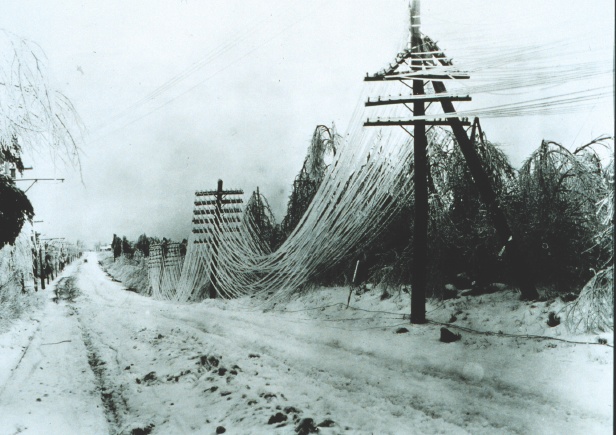In January of 1998, a huge ice storm hit a small region of Canada, in eastern Ontario, southern Quebec, and across to Nova Scotia, covering everything in a layer of ice. The weight of that ice toppled power lines and utility poles, crushing the power grid. Three million people in the province of Quebec were without power for as many as 6 weeks. Commuters were stranded in subway cars, temperatures dropped to -20°C, and no one had any power to heat their homes or their water. The storm was responsible for 27 deaths, and cost $3 billion in total losses. As you can imagine, this had a significant impact on the population, including, apparently, the next generation.
Monday, January 26, 2015
Sunday, January 25, 2015
Science This Week (Jan 19-25, 2014)
Medicine
Turning back the aging clock using telomere extension.

Observing the live function of proteasomes in brain cells.
Staying at home and watching Netflix is the best thing to do in a flu epidemic. (Open Access)
Mapping the brains of the blind sheds light on brain adaptation to rapid cultural and technological changes. (Open Access)
Flora/Fauna
Early human ancestors used their hands like modern humans.
Hidden infections in birds (and humans) speed up the aging process.
In rats, a greater number of sexual partners means more immunity against STDs. (Open Access)
Black bears eat ants, which is a huge help to the growth nearby plants.
Crows' bad reputation demystified.
Environment
Predicting unprecedented coral loss in the Great Barrier Reef. (Open Access)
Arctic ice cap slides into the ocean. (Open Access)
Climate affects the development of human speech.
Awesome!
The global firestorm generated by the dinosaur-murdering asteroid is unlikely to have occurred. (Open Access)
Laser-driven experiments recreate planet formation and conditions on super-Earths and giant planets.
Scientists have devised a way to ensure that GMOs can be safely confined in the environment using synthetic amino acids!
Why poor places are more diverse:
Turning back the aging clock using telomere extension.

Observing the live function of proteasomes in brain cells.
Staying at home and watching Netflix is the best thing to do in a flu epidemic. (Open Access)
Mapping the brains of the blind sheds light on brain adaptation to rapid cultural and technological changes. (Open Access)
Flora/Fauna
Early human ancestors used their hands like modern humans.
Hidden infections in birds (and humans) speed up the aging process.
In rats, a greater number of sexual partners means more immunity against STDs. (Open Access)
Black bears eat ants, which is a huge help to the growth nearby plants.
Crows' bad reputation demystified.
Environment
Predicting unprecedented coral loss in the Great Barrier Reef. (Open Access)
Arctic ice cap slides into the ocean. (Open Access)
Climate affects the development of human speech.
Awesome!
The global firestorm generated by the dinosaur-murdering asteroid is unlikely to have occurred. (Open Access)
Laser-driven experiments recreate planet formation and conditions on super-Earths and giant planets.
Scientists have devised a way to ensure that GMOs can be safely confined in the environment using synthetic amino acids!
Why poor places are more diverse:
Friday, January 23, 2015
Twitter as a Public Health Tool: language-based prediction of heart disease deaths
 Twitter is a really great way to let all your followers know what's on your mind and to share cat videos, and has been used to start social movements and launch careers, but did you know it can also predict coronary heart disease? According to a new study published in Psychological Science, Twitter can be used as an indicator of a community's well-being, and may become a powerful public health tool.
Twitter is a really great way to let all your followers know what's on your mind and to share cat videos, and has been used to start social movements and launch careers, but did you know it can also predict coronary heart disease? According to a new study published in Psychological Science, Twitter can be used as an indicator of a community's well-being, and may become a powerful public health tool.Sunday, January 18, 2015
When a Person Loses Weight, Where Does the Fat go?
Most new year's resolutions involve some type of weight loss activity. But have you ever wondered where the fat goes as you lose it? A recent study from Australia, published in the British Medical Journal, has found out exactly what it is that the body does when it loses weight. Take a deep breath... most of the excess fat is converted into CO2 and exhaled!
Subscribe to:
Posts (Atom)

